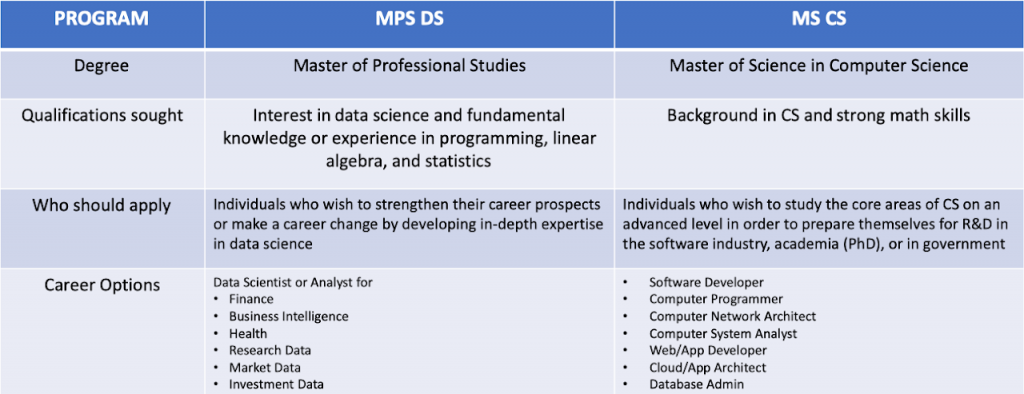What is an MPS degree? What are the differences between MPS and MS?
- Master of Professional Studies (MPS)
- MPS programs are specifically designed for working professionals, i.e. courses are offered at evenings and/or online; courses are taught by professionals; students do not write a thesis; and emphasis is on applications and tools; very little on theory.
- The MPS degree is geared towards professionals already in the field that require greater training, or people from disciplines not related to computing that wish to be trained for jobs in cybersecurity or data science.
- Master of Science (MS)
- MS programs are created for individuals who already have fundamentals in one area and who want to enhance their knowledge in that particular area. At UMBC, writing a thesis is an option for MS students; courses are taught by regular faculty members; courses are more challenging from theoretical and mathematical points of view.
- The MS degrees are typically meant for jobs in the industry that are technically focused. They often have specialized tracks — MS in CS for example has tracks in Data Science and Cybersecurity. They assume that the student has a degree in the discipline, or something very closely related.
- MPS and MS programs are not same.
- The courses in MPS and MS, though covering similar themes (e.g. Machine Learning), are designed very differently for people with different backgrounds and needs. For instance,
- A graduate with a BS in Economics wanting a career in Data Science would take the MPS degree. This student’s preparation would not be suited to the theoretical and mathematical elements of the MS program in CS, but their preparation would be ideal for the applied nature of the MPS.
- A student with an undergraduate degree in CS would be best suited to the more theoretical approach taken in our MS degree in CS.
- Regarding outcomes for students: an MS CS grad might be hired by a tech company to build the next generation machine learning platform; while an MPS Data Science grad might be hired to apply Data Science techniques such as machine learning to solve a practical problem.
- While these programmatic boundaries are not rigid, these examples should help illustrate the differences between our offerings.
An Important Note: if your expectations include
- learning the theory and principles behind data science,
- working under the supervision of a professor,
- working as a teaching assistant
- working as a research assistant and conducting research, or
- writing a thesis on data science,
then please consider MS in Computer Science program. Please see the tables below which compare these two graduate programs offered at UMBC.



